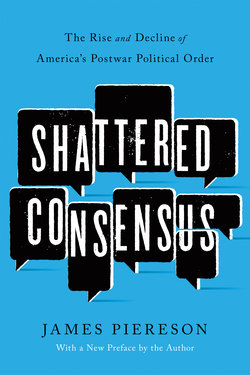Shattered Consensus

Реклама. ООО «ЛитРес», ИНН: 7719571260.
Оглавление
James Piereson. Shattered Consensus
Отрывок из книги
PRAISE FOR
Shattered Consensus
.....
In his own way, Keynes may have been as utopian as Wilson was in envisioning the postwar order. Wilson looked to transcend the balance-of-power politics that characterized the prewar regime in favor of a system of collective security as institutionalized in the League of Nations. That was judged by nearly everyone, including Keynes, to be a utopian vision and one that was unworkable under the conditions of the time. In much the same way, Keynes proposed a vision of European economic cooperation and integration that was equally implausible in a situation in which national rivalries and resentments had been inflamed by the deaths, damage, and overall suffering of the war. Keynes, in effect, was asking the warring parties of Europe to set aside their differences and forget past humiliations in the interests of mutual cooperation and economic progress, with the financial burden for that solution to be carried by the United States. None of the parties was willing to do that in 1919, and few people at the time thought that such a prospect was possible. The weight of history was still too great to allow for either the Wilsonian or the Keynesian solution.
It would take another war before such a vision could be seriously considered, this time under the supervision and patronage of the United States, motivated in large measure by the emergence of the Soviet Union as a potential adversary. As the Second World War approached an end, American and British planners sought to avoid the missteps of 1918 and 1919. This required in the first place the unconditional surrender of German forces and the Allied occupation of German territory. The remedies that Keynes proposed in 1919—relief, reconstruction, renewal of trade, cancellation of debts, limited reparations, stabilization of currencies, and integration of the vanquished into the postwar order—were generally accepted in 1945 as guideposts for the postwar order. Keynes, as the British representative at the Bretton Woods conference in 1944, played an important role in designing the institutional foundations of the postwar economic order: the World Bank, the International Monetary Fund, and an international currency regime pegged to the U.S. dollar. These policies and institutions, much in contrast to those adopted in 1919, established a basis for postwar security and prosperity across Western Europe and North America.
.....